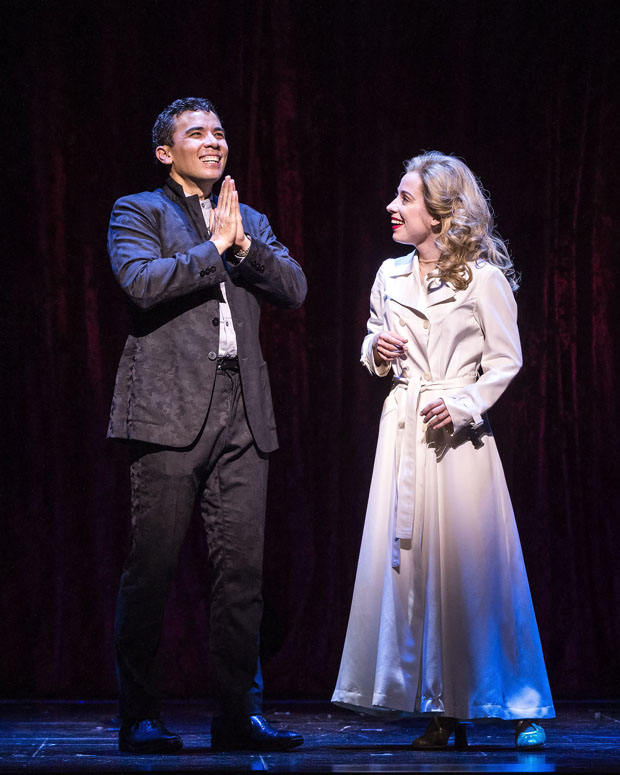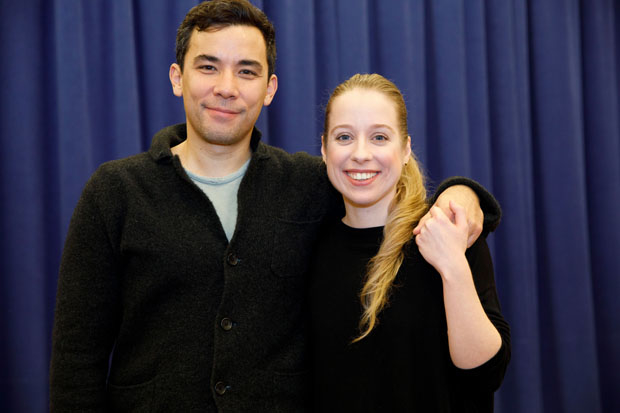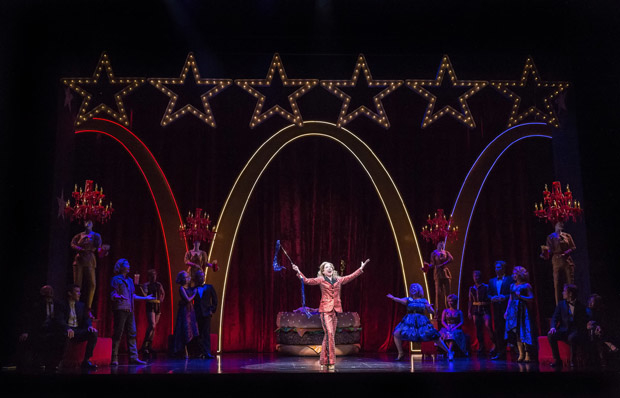Alyse Alan Louis and Conrad Ricamora Riff on The King and I and Hillary Clinton
David Henry Hwang and Jeanine Tesori’s new “play with a musical”, ”Soft Power”, debuts at the Ahmanson Theatre.
In March 2015, Lincoln Center Theater revived the beloved Rodgers and Hammerstein musical The King and I. Later that year, playwright David Henry Hwang was stabbed in the neck during a random attack in Brooklyn. And in November 2016, Donald Trump won the US presidential election, besting Hillary Clinton. While on the surface, these three events have absolutely nothing in common, they all intertwine in Hwang's latest work, Soft Power, written with fellow Tony winner Jeanine Tesori and premiering this month at the Ahmanson Theatre in Los Angeles.
Soft Power begins as a comedy, set before the 2016 election. An Asian-American writer named DHH (Francis Jue) is attending a performance of The King and I in Los Angeles with Chinese producer Xua Xing (Conrad Ricamora), with whom he is trying to create a TV show. There, they meet Hillary Clinton (Alyse Alan Louis), who is in town for a fundraiser.
Soon after, DHH is stabbed in the neck and passes out, where he finds himself living in a musical that takes place 100 years in the future. Influenced by the East-meets-West story of The King and I, this musical is about how China saved the world after the 2016 presidential election.
Ricamora and Louis were as bewildered by that brief description as anyone else. But Soft Power, directed by Leigh Silverman, is a multifaceted work about identity, racism, and politics. Once the pair of leading actors got their scripts, however, they jumped into this ripped-from-the-headlines story to build a new "play with a musical" from the ground up.

(© Craig Schwartz Photography)
What was your first reaction to this material?
Conrad Ricamora: I was like "What the hell is this?" [laughs] I was really skeptical. I came on board because of the creative team. I've seen their work, and I've always wanted to work with them. But I thought, "Oh…Hillary Clinton is singing and dancing? How is this gonna play out?"
Alyse Alan Louis: I was super excited and also felt like I wasn't smart enough for the material. I jumped right into the character, Hillary Clinton. When I first looked at the script and was auditioning for it, I tried to do a Midwestern accent.
Conrad: I remember that, and I was like, "That's so cool."
Alyse: We read together.
Conrad: I thought, "She really has this down."
Soft Power is described as "a play with a musical." How do you describe it to your friends and family?
Alyse: It starts out as a play, in 2016, here in LA, and then you're catapulted into the future into a Chinese musical looking back on the election.
Conrad: I just think of the strongest themes in the show, which are tackling racism, identity, and the 2016 election.
Alyse: It's a bit indescribable. We want people to experience it, sitting there firsthand. That's the best way to learn about the show.
Conrad: People I know who've come to see it talk about fellow audience members that are immediately engaged in conversations, passionately, about the themes that we are exploring, in a way that they haven't seen in theater.

(© Joan Marcus)
David Henry Hwang is known for writing semiautobiographical work. Was this an emotional rehearsal room when he confronted his stabbing?
Alyse: It's a vulnerable show, for sure, and it's a vulnerable process. But we're all so close, our cast and David and the rest of the team, and I believe that really made us feel free to be ourselves at all moments.
Conrad: And David is so not sentimental and precious about his own experience. Leigh constantly reminds me that when David was in the hospital after he got stabbed, he sent her a poop emoji in a text. From how it appears, he doesn't have any sentimentality attached to this. He's not watching it and reliving the experience every time, at least from what I can tell.
How would you describe Jeanine Tesori's score?
Alyse: Grand. There's nothing like performing with a 23-piece orchestra.
Conrad: I feel like from the first moment that the orchestra plays, it sweeps you up and carries you to the end. There's something about it that takes you on a ride and never sets you down.
Conrad, how does it feel to do a show that riffs on The King and I revival that you starred in?
Conrad: [laughs] I don't think about it. Ashley Park [who played Ricamora's love interest in "The King and I"] came and saw our final run-through in New York, and she was blushing the whole time. But the themes of Soft Power are things that we dealt with when we were making King and I. Questions like "How do we authentically tell this story, written by two white men, that was based on a book by a white woman who lived in Thailand, as Asian actors?"
We're always trying to make these characters more three-dimensional when they are sometimes not written that way, or not as fully fleshed out as the white characters. We deal with that theme in Soft Power, and that's a thread that I've dealt with my whole career.

(© Craig Schwartz Photography)








